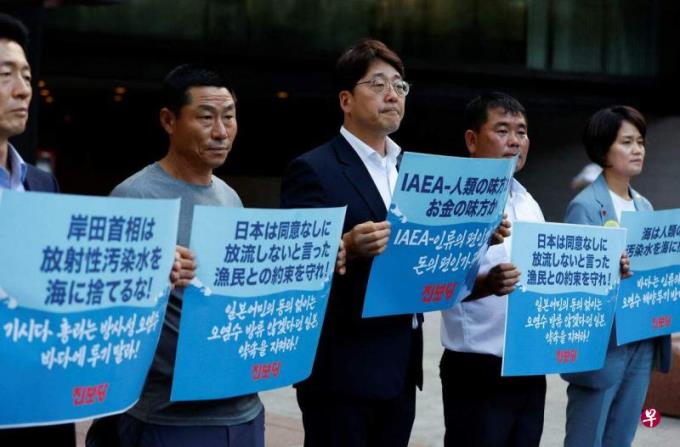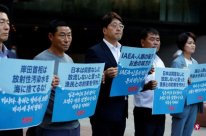
Gross, the director of the International Atomic Energy Agency (IAEA), who is visiting Japan (IAEA), met with Japanese Prime Minister Kishida Kishida on Tuesday (July 4), and announced the final safety review report of the radiation processing water discharge of Fukushima Nuclear Power Station.Giro said that Japan's emissions of nuclear waste water entering the sea is safe, but also stated that it cannot be used as a standard for approval policy.
To discharge nuclear sewage to Japan, the neighboring countries in Japan are opposed.South Korean media reported that local people bought salt in panic because of worrying about the seawater pollution.The Beijing side publicly criticized the Haihai plan and protested on Tuesday's press conference on Tuesday through the Chinese Embassy in Japan.
Analysis pointed out that although it was strongly resisted by neighboring countries and local Japanese oppositions, this report obviously opened a "international green light" for the Japanese government's nuclear sewage discharge.
The International Atomic Energy Agency, Groos, met with Japanese Prime Minister Kishita and Foreign Minister Lin Fangzheng in Tokyo on Tuesday, and handed over the comprehensive report on Fukushima nuclear power treatment water to the Japanese side.
NHK and other Japanese media quoted part of the content of the report, referring to IAEA "the planned safety of the process of processing water dilution of Tokyo Electric Power Company Fukushima First Nuclear Power Station";International Security Standard ".
Yomiuri News said that "IAEA announced a comprehensive report that meets international standards and believes that the impact on humans and the environment can be ignored."
Japanese Foreign Minister Lin Fangzheng and Grossi held a joint report meeting, "It will continue to explain the safety of water discharge to the sea in a transparent way in a transparent way.The understanding of society. "
Gronci said at a press conference: "According to Tokyo Electric Power Company's current plans to be controlled and discharged in stages. This can be ignored on the influence of human and environment."Water is the decision of the Japanese government. This report is neither recommended nor a standard for approval policies.
Regarding the technology of dealing with radiation pollution wastewater, he said: "Remove radioactive substances and dilute with water is not fresh. This is the technology existing in the industry ... China, South Korea, the United States, and France are in many countries.The emissions belt with water with a certain content of radioactive substances. "
The official emission date has not been announced
At present, Japan has not yet announced the date of emission, but with the review report of the international atomic energy agency, the official decision will be accelerated, and the discharge date may be released this week.It is estimated that it takes 30 to 40 years to complete the emissions.
Japanese government officials uniformly pointed out on Tuesday, and plans to dilute the accumulated water concentration accumulated by the Fukushima nuclear power plant to below the standard.
Kishida Wenxiong said at the Liberal Democratic Party's board of directors: "Regarding the treatment of water, the government will continue to ensure security and completely eliminate rumors from the outside world."
The Secretary -General of the Cabinet Matsno Matsuna said: "The review of the International Atomic Energy Agency is extremely important to enhance the understanding of the international community. In the future, we will discuss the content of comprehensive reports and want to explain in a well -understanding way in China and internationally.Related security. "
According to the latest survey of the Asahi Shimbun, 40 % of the Japanese have objected to the official handling water discharge into the sea.Miyagi Prefecture, adjacent to Fukushima, issued a comprehensive report of IAEA and held a opinion of the county parliament to adopt a opinion of the county council against the central government's treatment of radioactive water discharge of radioactive substances such as the Fukushima First Nuclear Power Station into the sea.
Kikuchi Kiki, Speaker of the County Council, said: "Even if the international organization (referred to as IAEA) believes that 'safe', it cannot be ignored by residents and fishermen. We strongly ask the government to take responsible measures."
The Japanese ruling party alliance Gongming Party leader Yamaguchi Nakinan also asked, "It must be avoided in this summer, because summer is the season when the Japanese seawater bath, and the criticism of criticism will be expanded."
China: IAEA report is not a nuclear processing water permit
Chinese Foreign Ministry spokesman Mao Ning said at a regular press conference that the report of the international atomic energy institution is not the "pass" of the Japanese side of the sea.Options.
Chinese Ambassador to Japan, Wu Jianghao, said in response to the Japanese media: "Discharge the nuclear pollution water generated by nuclear accidents to the sea. Since humans have used nuclear energy, this approach has no precedent., But everyone emits normal cooling water, not polluting water that the melting core contacts in the same accident.
"According to the existing ideas of the Japanese side, the process of exhausting the sea will last for 30 years or more. For the discharge behavior with so many uncertain factors and the duration, who monitors?Sexual? There are no practical conclusions. "
On the other hand, South Korea has remained unchanged against the food ban around the Fukushima Nuclear Power Station in Japan until the Korean public's concerns about food pollution.
Zheng Huanggen, the Minister of Food and Food of South Korea, said in an interview with Reuters on Tuesday that the ban will refuse the affected food from the Korean country, so the Korean public "does not need to worry about agricultural products."




